Address
Mauritius Digital Promotion Agency
2nd Floor, Wing A
Shri Atal Bihari Vajpayee Tower
Cybercity Ebène 72201
Phone
460 2600
Email
contact@mdpa.mu
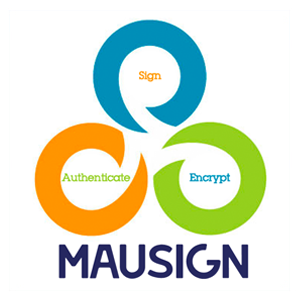
In the rapidly evolving world of digital communication and commerce, ensuring trust and security over the internet is of paramount importance.
The MAUSIGN CA is operated by the Mauritius Digital Promotion Agency (MDPA) and is licensed by the Controller of Certification Authorities (CCA) since July 2021.
MAUSIGN CA forms part of the National Public Key Infrastructure ecosystem in Mauritius and serves as a custodian of online trust and authenticity.
MAUSIGN CA is responsible to provide end-to-end digital certificate member services to citizens, public and private organisations, businesses and service providers.
The MAUSIGN CA currently provides the following types of digital certificates and services: –
(E-Sign Service)The E-Sign service allows citizens who are holders of a MauPass 2FA account to interact with Application Service Providers and digitally sign electronic documents/transactions with the service provider. For more information visit : https://mausign.govmu.org/
For enqueries on Mausign, contact us on support@mausign.govmu.org
The Government IoT (Internet of Things) Network aims at setting up a centralized open source Platform for the management of data generated by IoT sensors and devices.

The project aims to create an ecosystem of connected devices and sensors that can generate real-time data, which can be analysed to gain insights into various aspects of the country’s infrastructure, environment, and economy.
MDPA recognizes the vision of the Internet of Things (IoT) which describes a future where many everyday devices are interconnected through a network. These devices collect and share data of themselves and their surroundings to allow widespread monitoring, analysis, optimization, and control.
MDPA has set up the National IoT (NIOT) gateway to provide IOT services to Government Institutions, allowing them to reap IoT benefits without hefty set-up costs and long deployment lead time.
The Unified and central platform provides for device management, device data collection, and application enablement. The IOT platform follows recognised Network Reference Model for standards compliance and interoperability.
The platform is based on Open Source and uses LoRAWAN, used worldwide for connecting and monitoring end nodes and is supported by a wide range of connected products. Our network currently provide for:
The Objectives are:
MDPA in collaboration with ITU organised a regional workshop on the development of ICT ecosystem to harness Internet-of-Things (IoT). The participants gained knowledge regarding the technology and standards relating to IoTs, the critical parts of the ICT ecosystem required to mainstream IoTs, how IoTs can be deployed in other verticals through visualization of practical examples and other skills required on developing their own national and enterprise level strategies
MDPA is finalising the National IoT (NIOT) Policy in view of encouraging institutions and businesses to adopt the widely-used LoRAWAN technology and to make full use National IoT Network.
MDPA has deployed the IoT Smart Farming at FAREI with environmental IoT sensors, including weather stations for measuring of wind speed and direction, rainfall, UV level, light intensity, barometric pressure, humidity, temperature, soil moisture and air quality. The system is also configured for threshold alerts i.e. upon detection of low soil moisture level.
All these data are being collected in near real-time and is enabling FAREI Researchers to study the environmental impact on their production systems. The results would help farmers understand how to adjust all these environmental parameters within their specific farming environments for maximizing their production. MDPA has also worked with CWA by installing a smart water pulse/flow meter at Quartier Militaire reservoir by the MDPA and CWA technical teams.
Near real time data is sent via the National IOT infrastructure and a Web interface was set up as a dashboard showing pulse data readings as well as historical graph. MDPA has started in developing a basic Fleet Management system which utilises vehicle GPS tracker; this solution can be utilised by various agencies in Mauritius, with a potential for big savings.
We are also collaborating with the Ministry of Environment for their implementation of the “Lagoon Water Quality Index” and the “Online Surface and Ground Water Quality Monitoring” . The IoT sensors will be procured by the Ministry but all data collected will be effected through the National IoT Network.
For enqueries on Mausign, contact us on prd@mdpa.mu
GIS, or Geographic Information Systems, are IT tools to store locations, visualize them on a map, analyze, and interpret geographic or spatial data. GIS are in use in Mauritius by several Institutions, most often with commercial ArcGIS tools.
MDPA successfully set up a National GIS (NGIS) Platform, a precursor in Mauritius for this technology for public sector. The NGIS operates on Open Source QGIS with reduced cost benefits.
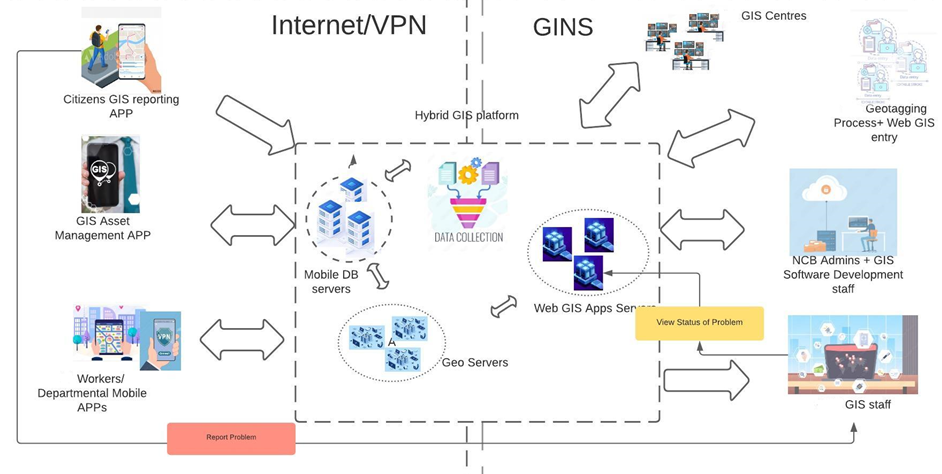
The benefits of the NGIS are:
GIS Assets system was developed as pilot for District Council Moka and subsequently replicated for all 12 Local Authorities (Municipalities and District Councils). The system allows to be mapped, visualized, analysed, helping Management to make quick informed decisions for maintenance, repair or replacement.
Assets being monitored include roads, drains, electric poles, buildings, amenities, projects. GIS System was implemented as Open Source leading to large cost savings as compared to license & development cost for commercial applications.
A Mobile App was also developed to allow mapping of assets by field officers with accurate GNSS precision.
MDPA is also working with the Ministry of Environment for the setting up of a “Web GIS Interface for Environmental Planning” to enable remote access and viewing of all their GIS data and layers by non-technical Management staff for planning and decision making.
For enqueries on Mausign, contact us on prd@mdpa.mu
The main objective of setting up Open Data Portals is to create economic value out of the releases of Government datasets. Open Data is considered at the bedrock of innovation which will be the driving force of the Mauritian economy in the next few years. Opening up of datasets will go a long way towards stimulating the economy to the benefit of all economic operators, including Small and Medium Enterprises.
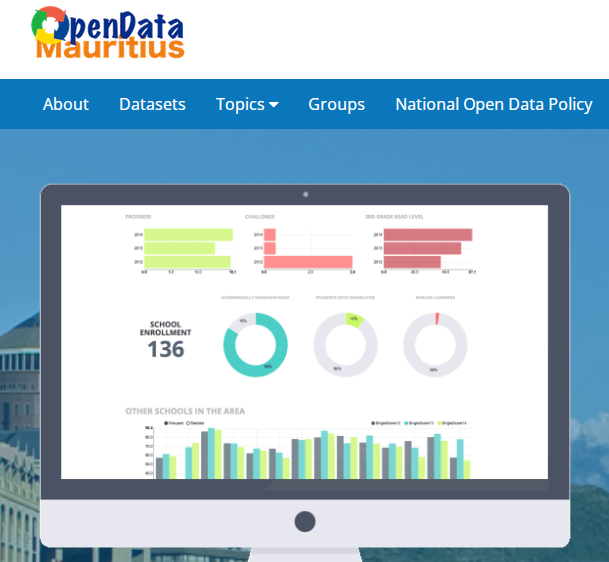
In 2017, Mauritius adopted the “National Open Data Policy” to provide access to a wide range of public sector data via online portal(s), with the aims to promote transparency, accountability, and innovation by making government data available to citizens, businesses, researchers.
By opening up data through the Open Data portal, Government aims to promote:
MDPA, has since 2018, set up the Open Data portal, hosting at present over 500 datasets. Open Data is viewable and downloadable free in various formats such as CSV, XLSX, and JSON.
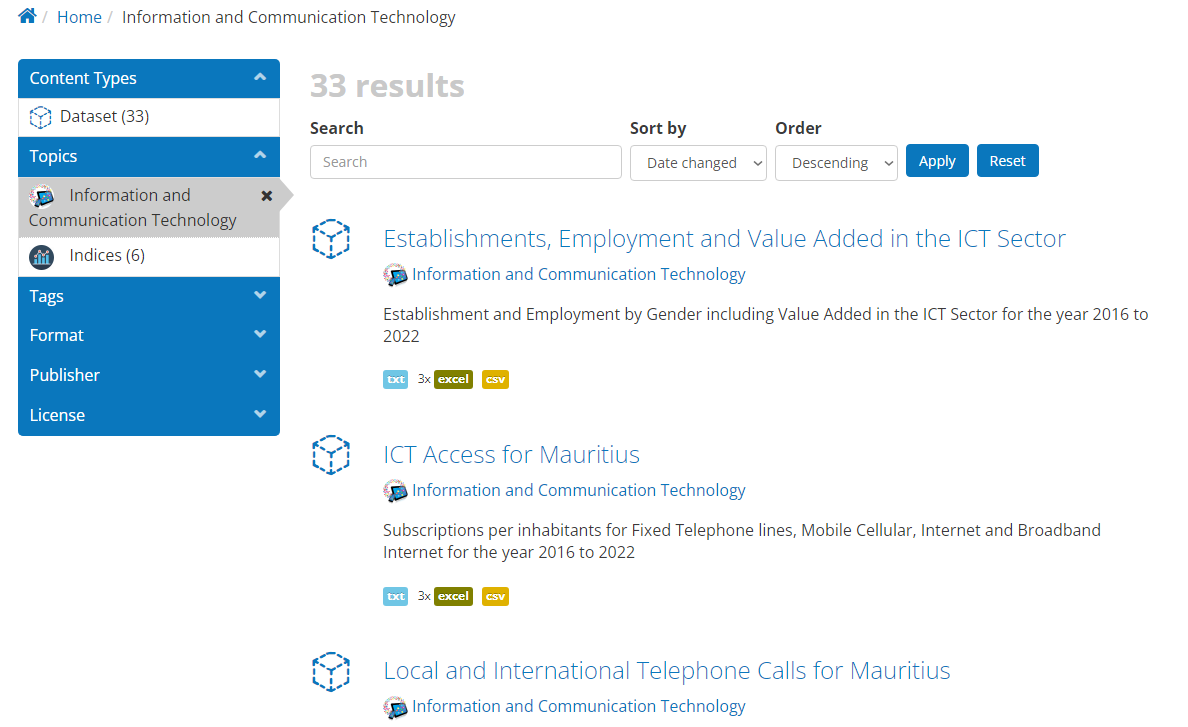
The GeoSpatial Portal compiles geospatial datasets and maps and has some 20 layers.
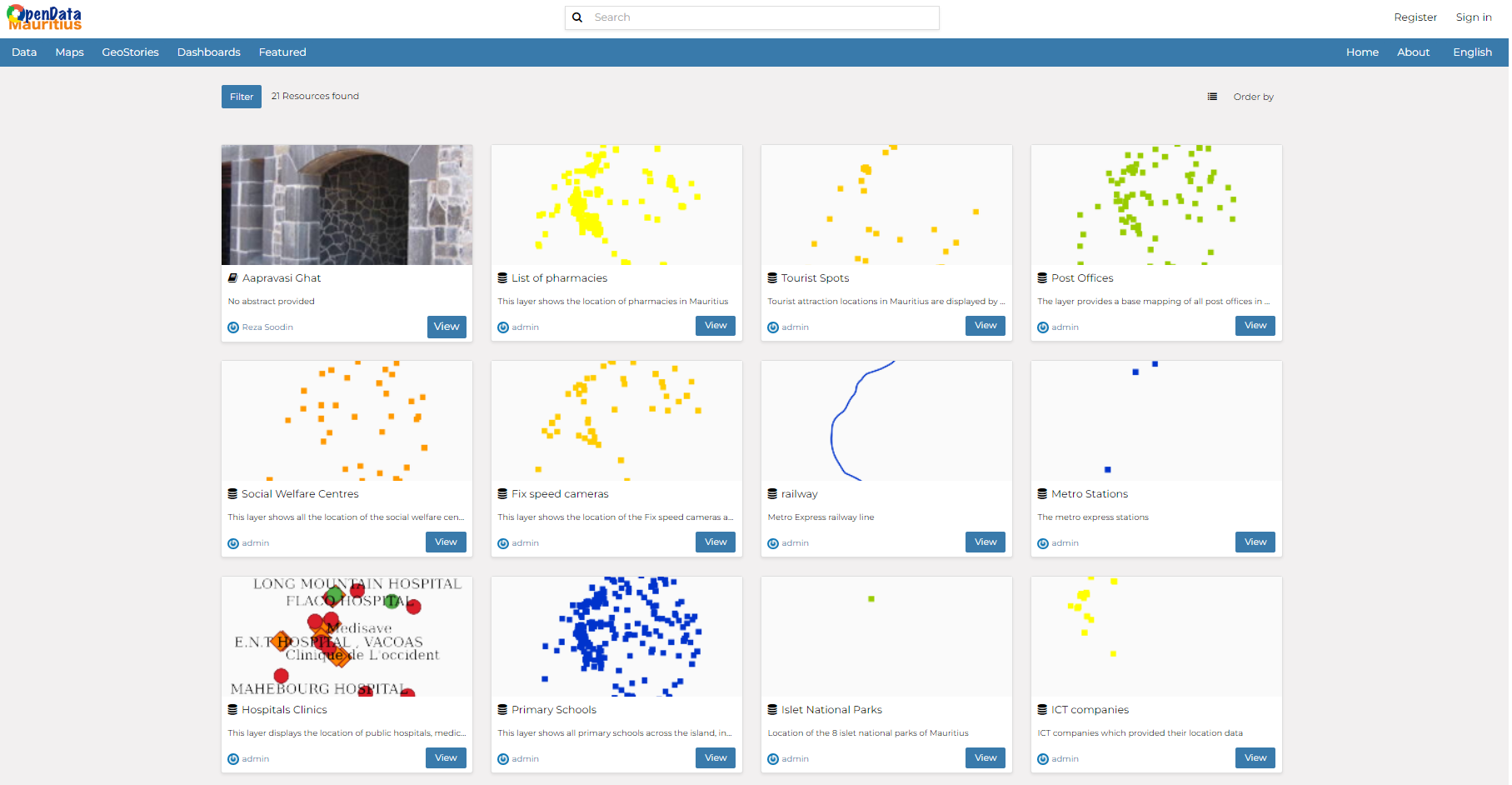
A Mobile App “Ki Kote” is being developed which uses real-time GeoServer maps to offer location, contact info and map-based navigation. Maps currently available include ATMs, Police & Fire stations, Speed Cameras, Hospitals & Pharmacies; CEB and CWA service centres, Gas stations etc..
Visit the Open Data portal at https://data.govmu.org
Visit the GeoSpatial Portal at https://geoportal.govmu.org
For enqueries on Mausign, contact us on opendata@mdpa.mu
Girls in ICT Day is celebrated worldwide and activities organised to bridge barriers girls face in ICT education and to reduce gender inequalities by providing digital skills and tools to girls.
The MDPA organised phase 1 of 3D Design & Printing Boot Camps in 2 Educational Zones for the benefit of girls attending secondary schools to mark Girls in ICT Day 2024. This Girls in ICT Project was organized in collaboration of the Ministry of Education, Tertiary Education, Science and Technology.
The objectives of organising the Boot Camps are as follows:
Phase 1 of the Boot Camps was held in Zones 1 and 2 during the Easter Holidays for grade 12 students during school Easter holidays from the 15th to 18th April 2024 as follows:
Zone | Venue for Boot Camp | Dates | No. Colleges | No. Participants |
1 | Droopnath Ramphul SC | 15 to 16 April 2024 | 7 | 26 |
2 | Rajcoomar Gujadhur SSS | 17 to 18 April 2024 | 10 | 33 |
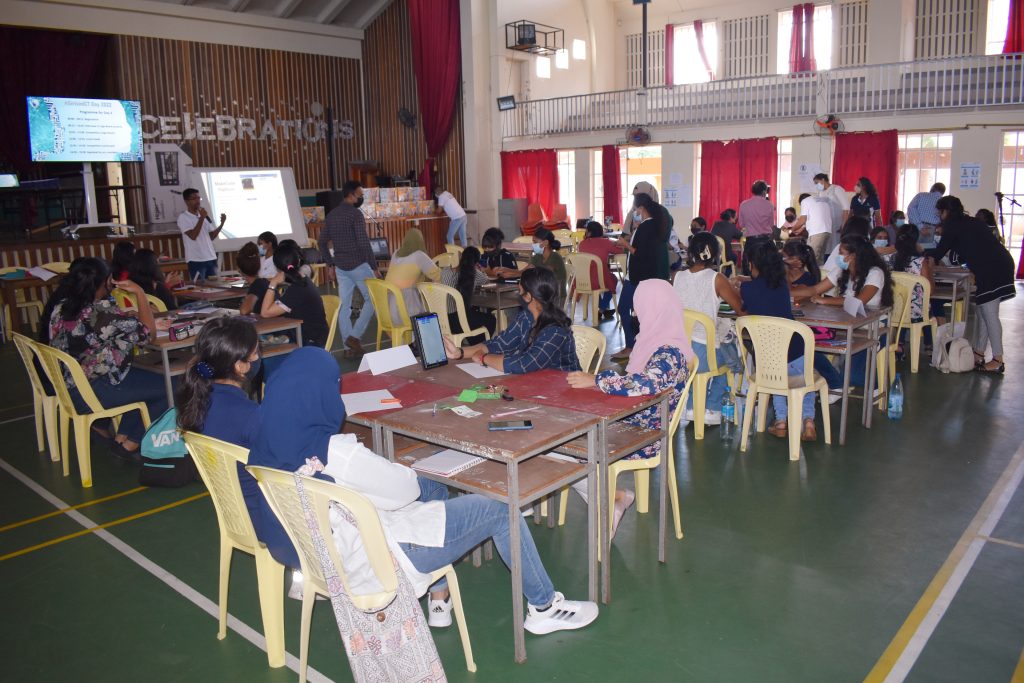
Day 1 of each boot camp initiate participants on how to 3D design objects through a user friendly software and Day 2 was devoted to hands-on assignments as well the organising of a Competition to assess teams on their 3D Design skills. The vast majority of the participants had an excellent opinion about the boot camps and recommended the boot camp to other girls.
Zone 1 | Zone 2 |
Name of Secondary School | Name of Secondary School |
Droopnath Ramphul State College (Girls) | Beau Bassin SSS (Girls) |
Lady Sushil Ramgoolam SSS (Girls) | Bel Air Rivière Sèche (Girls) |
Pailles SSS (Girls) | Bon Accueil State College (Girls) |
Pamplemousses SSS (Girls) | John Kennedy College (Mixed) |
G. M. Dawjee Atchia State College (Girls) | Mahatma Gandhi Secondary School, Moka (Mixed) |
Simadree Virahsawmy SSS (Girls) | Mahatma Gandhi Institute Secondary School (Mixed) |
Royal College Port Louis (Boys & Girls) | Manilall Doctor SSS (Girls) |
Quartier Militaire SSS (Girls) | |
Queen Elizabeth College (Girls) | |
Sir Leckraz Teeluck SSS (Mixed) |
Competition
In order to encourage more girls in the field of Technology the MDPA also organised a competition on Day 2 of the Boot Camp to reward the best team for the most innovative objects designed. The students had to design a 3D model based on a design assigned to them in a time frame of 2 hours. Winners of the competition will be announced at a later stage.1 `
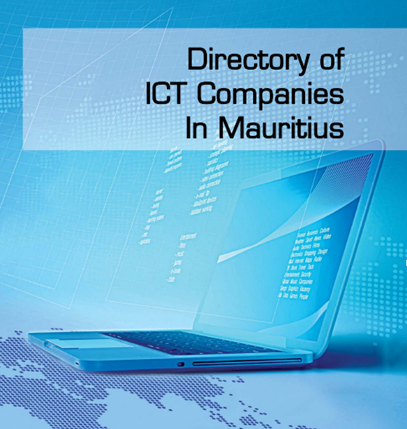 The ICT Directory is an important resource for local and international businesses for locating all ICT Firms operating in Mauritius as well as their sector of activity.
The ICT Directory is an important resource for local and international businesses for locating all ICT Firms operating in Mauritius as well as their sector of activity.
MDPA (formerly the National Computer Board) has produced many editions, in hard copies, of the “Directory of ICT Companies in Mauritius”.
The Directory is now being replaced with a web site which compiled major local ICT operators, their contact details, information on their areas of activities, expertise, products and services, Number of employees, turnover, their export markets etc..
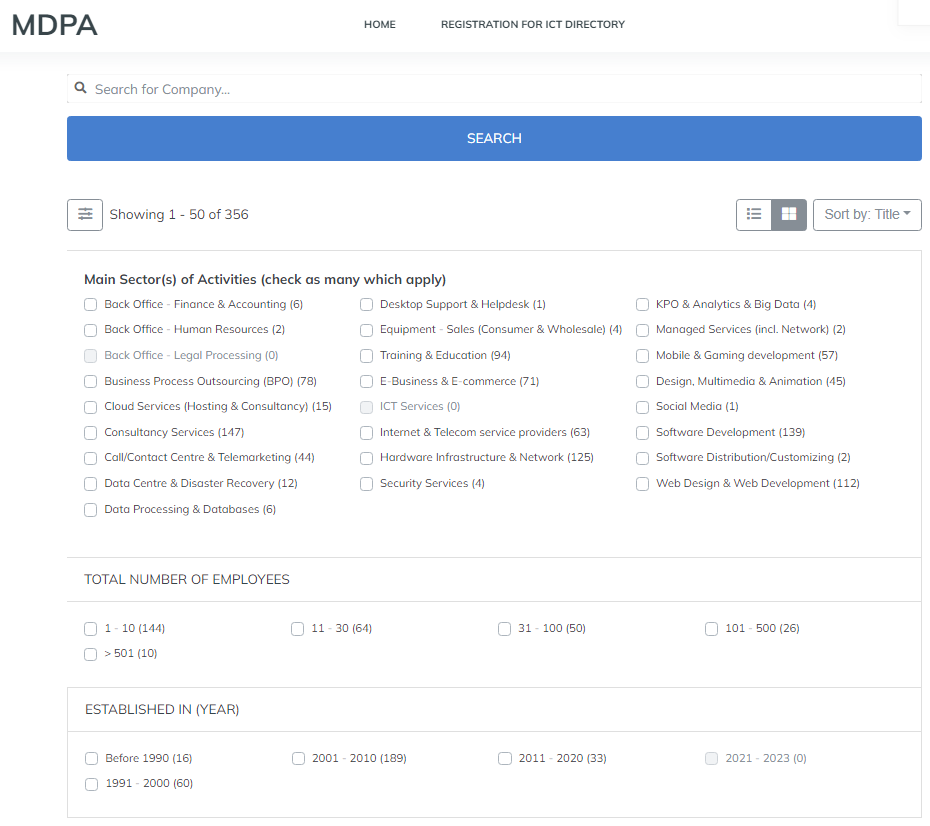
Statistics and Indicators are generated, compiled and published by various institutions for different sectors. The ICT Indicators of MDPA regroups specifically indicators for the ICT sector which it obtains from various sources.
The Mauritius ICT Indicators Portal consolidates all ICT-related indicators and statistics for Mauritius. The portal also promotes proper management of statistical data that can be used for policy research, plans and projects development and implementation, and analysis of the ICT sector.
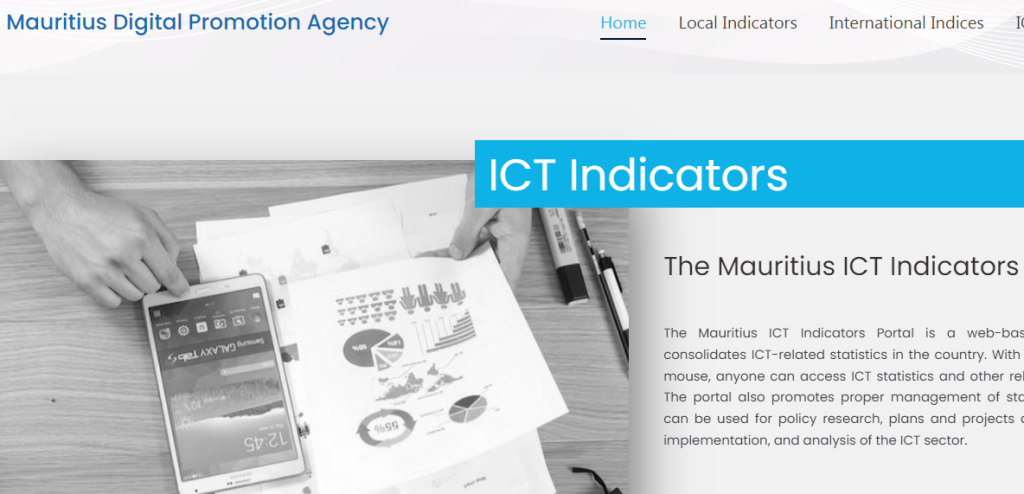
MDPA is revamping its ICT Indicators website, aligned with International Indicators such as ITU, OECD, SADC. We compile the statistics from various sources namely ICTA, TEC, EDB, Statistics Mauritius, CERT-MU. Indicators once formatted are then posted on the website. The main fields covered are Economic, Infrastructure, Tariffs, Education, Manpower, Business Usage, Household Penetration, Security.
We also keep track of Global indices: E-Gov. Development index, Network Readiness Index, Global Innovation Index, Global Cyber Security Index and prepare Quarterly newsletters.
For more info visit: https://indicators.govmu.org/ictindicators/
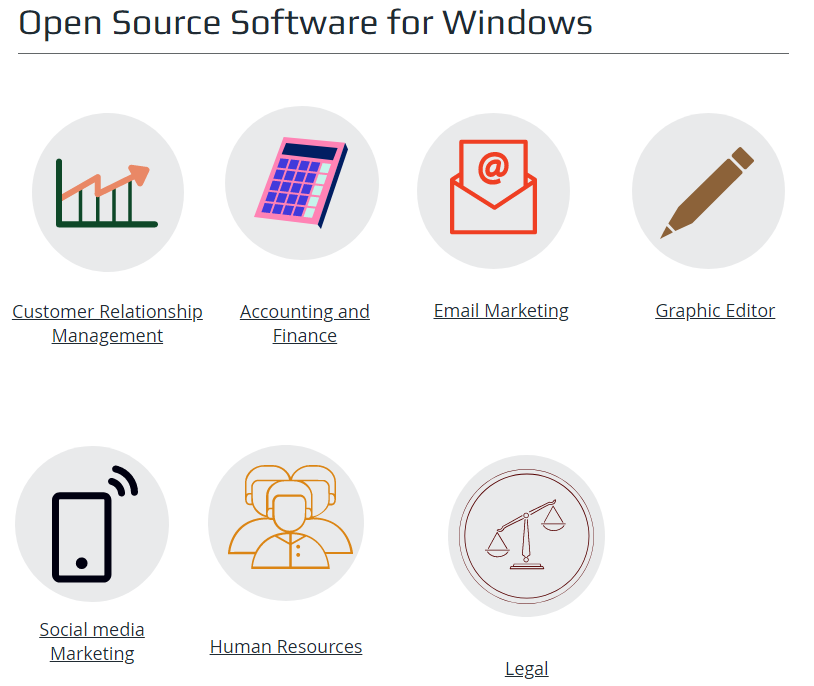 Open Source Software (OSS) has to be demonstrated as a real opportunity for the private sector, specifically for MSMEs. Companies are increasingly adopting Open Source applications as serious alternatives to commercial ones, with substantial cost savings in terms of licenses.
Open Source Software (OSS) has to be demonstrated as a real opportunity for the private sector, specifically for MSMEs. Companies are increasingly adopting Open Source applications as serious alternatives to commercial ones, with substantial cost savings in terms of licenses.
In view of promoting the adoption of open source in Mauritius, MDPA has set up a repository for main Open Source applications for the benefit of MSMEs.
Often, one of the most daunting part of running or expanding a small business is selecting the proper software to accompany its growth, especially for businesses which are family run.
SMEs limited manpower, finances and time require guidance to select among the thousands of software, apps and tools. Many tools are available as monthly or yearly subscriptions, and those costs can add up fast; however free or open source alternatives do exist and can be customized for Mauritian SMEs.
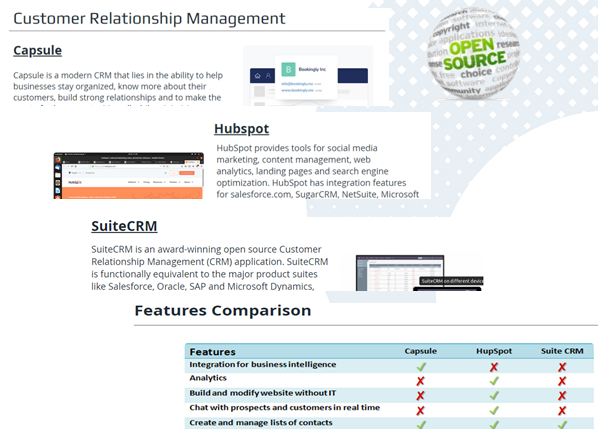
The 6 main application covered are:
The pilot sites are being revamped and merged into a new modern website.

The Children Innovative Learning and Design (ChILD) programme was first announced in budget 2021/22. ChILD is a new ICT educational initiative which pertains to the initiation of Coding and Robotics to Grades 4, 5 and 6 pupils at primary level.
Since 2021, the Mauritius Digital Promotion Agency (MDPA) is implementing the ChILD programme in various primary schools across the island in collaboration with the Ministry of Education, Tertiary Education, Science and Technology (MoETEST), and the Special Education Needs Authority (SENA since 2022).
The ChILD Programme aims at introducing Robotics Kits to upper primary students while equipping them with the required coding capabilities. This innovative and enlightening programme allows the children to design and build their own robots using the DIY (Do It Yourself) concept.
The main objective of initiating our Kids and Youngsters to Coding and Robotics is to foster a predilection for science and engineering so as to inspire them to embrace STEAM (Science, Technology, Engineering, Arts and Mathematics) subjects.
The official launching of the ChILD Programme which took place on 07 April 2022 at Rajcoomar Gujadhur GS (Flacq) was organised by MDPA in collaboration with the Ministry of Education, Tertiary Education, Science and Technology, and the Ministry of Information Technology, Communication and Innovation and whereby both respective Hon. Ministers were present, among other VIPs.
The ChILD is a 12 Hour training programme consisting of 2 core modules namely: Scratch Coding 3.0, and Robotic Kits. The training is delivered by the ICT Support Officers (usually referred to as ‘ICT Teachers’) in the Computer Labs of primary schools.
It is to be highlighted that prior to the rolling out of ChILD programme in schools, Capacity Building /Training-of-Trainers Workshops are conducted by MDPA to empower the ICT Support Officers to become confident users of the Robotics Kit. The workshops are organised in collaboration with the MIE in their Computer Labs.
Each school receives a Robotics Kit (Codey Rocky) by the MDPA for the rolling out of the programme. Course materials pertaining to the ChILD Programme are developed by the MDPA and provided to ICT Support Officers. The list of primary schools and ICT Support Officers earmarked for the ChILD programme are provided by MoETEST to MDPA.
It is worth highlighting that the effective implementation of the ChILD Programme depends to a large extent on the engagement and commitment of the ICT Support Officers since additional tasks are being assigned to them. A stipend is thus granted to the ICT Support Officers in a bid to actively involve them in the ChILD project.
As at date, the MDPA has successfully rolled out the ChILD programme in 72 primary schools (Govt & RCA) and 12 Special Education Needs (SEN) schools. Some 12,700 pupils have benefitted from this programme. 191 teachers have participated in the Capacity Building /Training-of-Trainers Workshops.
For the academic year 2024, ChILD programme is being rolled out in 75 (additional) primary schools and 18 (additional) SEN schools from February to June 2024. Some 9,000+ pupils are expected to follow this programme.
After completing the ChILD programme, each student receives a Certificate of Participation from the MDPA. A Certificate of Participation is also granted to the ICT Support Officers who have participated in the Capacity Building /Training-of-Trainers Workshops.
It is to be highlighted that very positive feedbacks have been received from the school community. It is envisaged to implement the ChILD programme in all primary schools (Govt & RCA) in Mauritius and Rodrigues by June 2025.
For enqueries on Mausign, contact us on ictcp@mdpa.mu
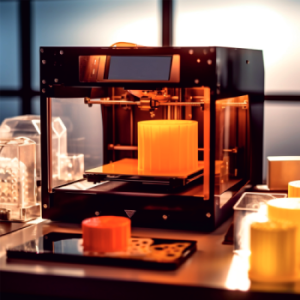
The Mauritius Digital Promotion Agency (MDPA), pioneer in promoting 3D Printing Technology since 2018 at national level has worked in collaboration with various institutions in 3D printing of: artificial reefs and bases for coral breeds, 3D braille and education puzzles for visually impaired persons. In addition, 3D casings was printed for IoT atmospheric sensors, face shields for children with hearing impairment and for front liners. The Centre also printed Graduator Injector Cylinder Head for planters, shields among others.
The main aim of the 3D Printing Unit of MDPA is to promote its adoption among various enterprises of different sectors of the economy and to facilitate 3D Printing services.
To date, the Centre carried out some 6000 printing services for Students, MSME’s and others while some 1,900 students and 148 MSME’s have benefited from the awareness sessions.
The main objectives of the 3D Printing Unit are as follows:
The 3D Printing Unit of MDPA is providing the following services
To book any one of the above services kindly fill the contact form and send it to the MDPA 3D Printing team on 3d@mdpa.mu
Following which our team will revert back to you for additional details.
Upon clicking on the above services the following details will appear.
3D Printing is an additive process whereby a digital Computer Aided Design (CAD) model is converted into a solid, three-dimensional object by laying down many successive layers of material in the form of plastic following a G-code pattern (x, z, y axis) until the object is created. The CAD model has to be sliced into a G-code format which is the standard language for a 3D printer.
Click here for the guidelines for 3D Printing. To apply fill up the contact form and send it to the MDPA 3D Printing team on 3d@mdpa.mu
3D Designing refers to the process of creating three-dimensional digital models of objects using computer aided design software. 3D designing not only help to model and visualize real world products and elements but to study and optimize its design before its goes into the manufacturing process. This method allows to re-do faster on designs and hence reduce prototyping costs. Before printing, the 3D designs need to be exported to a STL format which is commonly used by 3D Slicer.
The accuracy of the 3D Printed object depends on the quality of the design. Design on paper can also be transferred to 3D Design to produce your prototype.
Click here for the guidelines for 3D Designing. To apply fill up the contact form and send it to the MDPA 3D Printing team on 3d@mdpa.mu
3D scanning is the process of converting physical objects into digital models. This process enables quick and accurate capture of an object shape, geometries, and supplies with a complete digital representation of the part to be created. This helps to reconstruct, analyse or stimulate ideas.
Click here for the guidelines for 3D Scanning. To apply fill up the contact form and send it to the MDPA 3D Printing team on 3d@mdpa.mu
3D Prototyping is the process of easily creating designs of a non-final version of a new product or improve an existing one. This process helps to test design ideas and to get information that will help future production process. 3D prototype is created using 3D Model Software.
Prototyping bears numerous benefits such as:
To apply fill up the contact form and send it to the MDPA 3D Printing team on 3d@mdpa.mu
Laser Cutting refers to a process that uses a high power laser to engrave, raster and cut different non-metal materials such as carton, acrylic etc. The process uses a motion control system to follow a G-code (x, y axis) pattern. The focused laser beams melts and burn the material by a jet of gas to leave a surface finished edge. The laser light is focused at the work area by mirrors optics that direct the beam through a lens which intensifies it.
Click here for the guidelines for Laser Cutting. To apply fill up the contact form and send it to the MDPA 3D Printing team on 3d@mdpa.mu
The Mauritius Digital Promotion Agency has set up its 3D Printing Showcase Area on the 2nd floor of Wing A, Atal Bihari Vajpayee Tower, Ebene. The setting up of this showcase area is to better facilitate and extend the services of the 3D Printing Technology to a greater part of the citizens namely university students, startups, micro enterprises, medium enterprises, small enterprises, SME’s and Individuals among others.
The MDPA organizes Awareness Sessions on 3D Printing Technology for students of Secondary Schools. The main objectives of the Awareness Session are to
1. Initiate students on the concept of 3D designing
2. Conduct demos on 3D Printing technology in view to show a better means of producing viable parts for final year project
3. Promote the STEM subjects and the MDPA 3D Printing services
To date 2,569 students and educators have already benefited from the awareness sessions on 3D Printing Technology.
To apply fill up the contact form and send it to the MDPA 3D Printing team on 3d@mdpa.mu
With the objective to promote the adoption of 3D Printing Technology among various sectors of economy, the MDPA is providing Business advice to start-ups willing to set up a 3D Printing Machine/ Lab. This service is also extended to Entrepreneurs, MSME’s, SME’s and Companies, opting to adopt 3D Printing technology in their manufacturing process.
The business counselling sessions are conducted at the 3D Printing Centre where clients are briefed on all the essential steps that should be followed in view to implement their business. This service is provided upon appointment.
To apply fill up the contact form and send it to the MDPA 3D Printing team on 3d@mdpa.mu
The Mauritius Digital Promotion Agency in collaboration with the Ministry of Information Technology, Communication and Innovation is making big moves towards a high-tech future!
On April 25th 2024, the Minister of Information Technology, Communication and Innovation, Hon. D. Balgobin launched the exciting project Digital Lab on the Go, also known as DLOG.
This initiative is all about creating a “Smart and Intelligent Mauritius”, for a more digitally inclusive society.
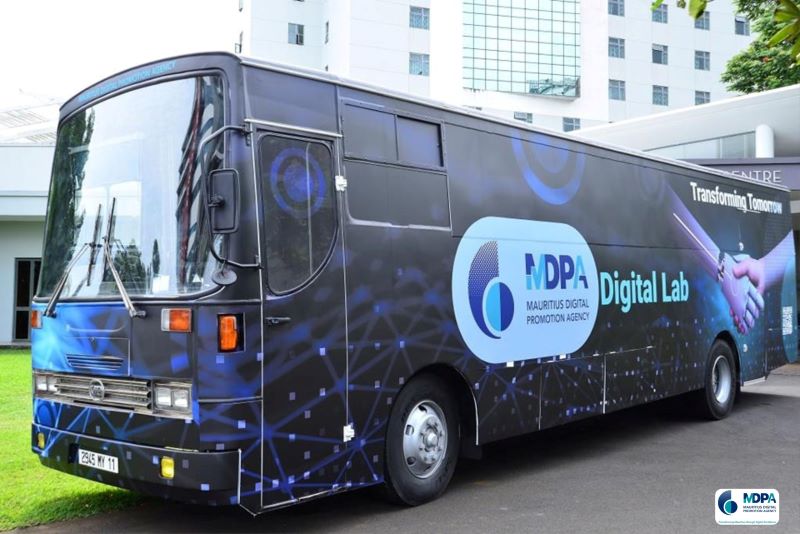 This coolest mobile lab is bringing cutting-edge technology straight to your doorstep! The MDPA Digital Lab offers free, interactive demos on all sorts of emerging technologies, like:
This coolest mobile lab is bringing cutting-edge technology straight to your doorstep! The MDPA Digital Lab offers free, interactive demos on all sorts of emerging technologies, like:
Since its launch in April 2024, over 3,500 citizens across 30 regions have experienced the immersive experiences of the Digital Lab and we are aiming to reach another 8,000 citizens by this June 2025.
This is a fantastic way to get everyone involved in the digital revolution, no matter your age. Let’s move along to build up a Digitally Empowered Society!
 The Digital Proficiency Course (DPC) is an immersive and comprehensive program offered by MDPA’s Digital Skills Development Department. This course is designed to equip individuals with the essential digital skills and knowledge needed to thrive in today’s digital landscape.
The Digital Proficiency Course (DPC) is an immersive and comprehensive program offered by MDPA’s Digital Skills Development Department. This course is designed to equip individuals with the essential digital skills and knowledge needed to thrive in today’s digital landscape.
Through a combination of theoretical learning and practical exercises, participants gain proficiency in various digital tools, platforms, and technologies. The DPC covers a wide range of topics, including digital literacy, online communication, data analysis, digital marketing, and cybersecurity.
By completing the DPC, individuals enhance their digital capabilities, enabling them to confidently navigate the digital world and seize opportunities in their personal and professional lives.
For more information visit: https://dpc.govmu.org/
For enqueries on dpc, contact us on dpc@mdpa.mu
